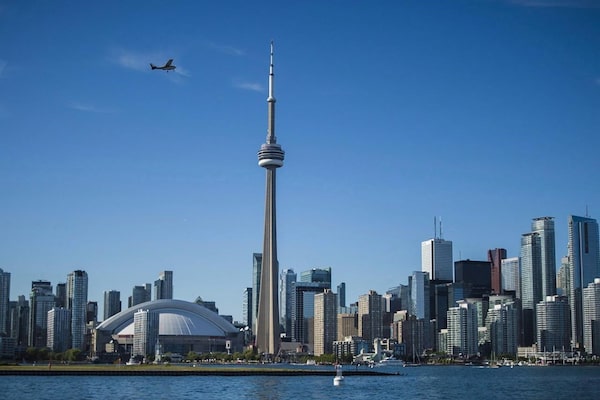
In the Toronto area, the cost of an average two-bedroom apartment rose 6.5 per cent in 2019 to $1,562 a month, the largest percentage increase in nearly two decades.The Canadian Press
As the COVID-19 pandemic dampens tenant demand, there are mounting signs that residential rent inflation is slowing, particularly in urban markets that have been racked by affordability concerns for years.
The asking price for rentals in Toronto and Vancouver has either fallen or remained stable, depending on the unit size, a variety of recent data show. The shakeup is particularly noticeable for condos, which account for a growing share of rental supply.
During the first half of May, the median monthly rent for a condo leased in the Greater Toronto Area was $2,200, down 4.3 per cent ($100) from the same period a year ago, according to data provided to The Globe and Mail by research company Urbanation. The number of signed leases plunged 42.5 per cent, but new listings rose 7 per cent as some condos reached completion and investors sought long-term tenants for their underused Airbnb units.
“Obviously, we are seeing demand and supply moving in two different directions right now,” said Shaun Hildebrand, president at Urbanation.
Demand is unlikely to pick up soon. Because of the pandemic, immigration has dropped significantly, sapping a key source of rental demand. Colleges and universities may continue to conduct their classes virtually in the fall, keeping students home with mom and dad. And renters have been disproportionately affected by job losses, relative to homeowners, which could sway them from leaving rent-controlled units.
Meantime, despite a short-term hiccup to construction, tens of thousands of purpose-built rental and condo units are set to be completed in the Toronto and Vancouver areas this year, ensuring that a steady stream of housing becomes available as demand cools.
Further, with inbound tourism screeching to a halt, many hosts on short-term rental platforms such as Airbnb have been forced to rent their units to long-term tenants, adding to supply. In April, new listings of furnished condos – a rough proxy for short-term rentals – in the GTA surged 91 per cent from a year earlier, Urbanation said.
What is the reopening plan in my province? A guide
Coronavirus guide: Updates and essential resources about the COVID-19 pandemic
All of these factors have coalesced to weigh on rental prices.
“Rents in the major cities seem to be falling fast,” Stephen Brown, senior Canada economist at Capital Economics, wrote in a recent client note. He projected that “rents seem likely to decline by at least 5 per cent to 10 per cent in Toronto and Vancouver.”
For renters in those areas, that would offer a welcome respite. Both regions have been marked by lacklustre purpose-built construction, scant vacancies and surging prices for years, leading to considerable frustration for tenants.
In the Toronto area, the cost of an average two-bedroom apartment rose 6.5 per cent in 2019 to $1,562 a month, the largest percentage increase in nearly two decades, according to Canada Mortgage and Housing Corp. In the Vancouver area, the cost of an average two-bedroom apartment rose 6 per cent to $1,748 a month. Asking rates for new listings are substantially higher.
Condos are especially pricey, too. The average two-bedroom rented monthly for $2,476 in the Toronto area last year, and for just more than $2,000 in the Vancouver region.
Mr. Hildebrand said many of the condos now reaching completion were sold four or five years ago, when prices were much lower. A sizable portion of buyers are investors who rent out the units. For those who made a large down payment – say, 25 per cent – there’s enough wiggle room to lower rents while staying cash-flow positive, he said.
“These are individual investors – they’re not professional management companies,” Mr. Hildebrand said. “Their goal is to cover their mortgage payments as quickly as possible.”
But for highly leveraged investors, the current rental climate is risky. John Pasalis, president of brokerage Realosophy Realty, said the Toronto area has plenty of people who “overextended themselves” to buy multiple properties.
“These were investors who, a year ago, couldn’t care less if they were cash-flow negative [by] $500, $600, $700 a month on their condo investment, because in their mind that was going up 10 per cent a year, so it didn’t really matter,” Mr. Pasalis said. "Well, in a recession, you can’t be cash-flow negative on two or three or four rental properties. That’s going to destroy you.”
In turn, some investors could be forced to liquidate their units, which could weigh on resale prices, Mr. Brown of Capital Economics said.
“With property investors basing their price expectations on the assumption that rents would instead keep rising strongly, this represents a big risk to house prices,” he wrote.
The purpose-built rental market is another story, Mr. Hildebrand noted. Thus far, units are being rented for similar prices as before the pandemic in the GTA. Looking forward, about 2,400 purpose-built units are slated for completion there this year, or a fraction of what’s expected in the condo market. Given that many renters want to live in buildings with professional management, demand should be less of a concern.
“From what I’ve been hearing, the lease velocity has slowed … but it hasn’t completely vanished,” Mr. Hildebrand said. “Units are still renting.”
Sign up for the Coronavirus Update newsletter to read the day’s essential coronavirus news, features and explainers written by Globe reporters.
 Matt Lundy
Matt Lundy